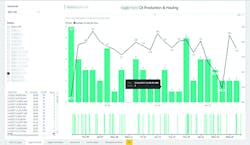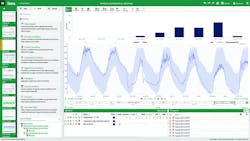Devon Energy is a leading independent oil and natural gas exploration and production company based in Oklahoma City with onshore operations in the U.S. and Canada. The company’s production portfolio consists of 46 percent oil, 37 percent natural gas and 17 percent natural gas liquids (NGL).
One of the company’s most important assets is its tank batteries and the contents therein, located at unmanned, remote production sites. Managing the condition of these tanks, specifically the unloading of contents, is essential to optimizing operations.
The liquid haul-off process for these tank batteries is used to separate the oil and water components, and previously involved a significant amount of manual data entry. This complex operation involves custody transfer of oil and water from the production facility to a tanker truck to move the product to a point-of-sale.
Ideally, trucks are dispatched to site when the tanks approach capacity, but not any sooner. This is because Devon Energy pays to transport a full load whether or not the truck is actually filled. On the other hand, if the tanks are not emptied in time, the company would have to halt production, which would be even more costly.
In the past, the truck drivers would simply write the amount of oil or water loaded onto their vehicles, and put this document in a mailbox somewhere on the site. Various employees around the company would then manually enter this information into spreadsheets. As a result, the company could never be sure if what the trucker wrote down was accurate. The central operations group didn’t know what the contracted truck drivers were doing, or even when they were on site, which posed an operational and safety risk. The entire process was slow, time-consuming and prone to error.
Intelligence required
Specifically, when a truck was on site, the oil marketing and water management business groups wanted to know:
- Did the driver pick up oil or water?
- How much oil or water was taken?
- Was there more than one truck on site?
- Did each truck receive a full or partial load?
- At what rate are the tanks filling up?
- Could they predict when the next load pickup would need to occur?
- Could they get enough data to rate the truck service providers?
- What is the current level of the tank battery?
Figure 1. Dashboard display shows remote tank haul-off data. All figures courtesy of Seeq
Situational awareness and predictive analytics
Data engineer Don Morrison is part of Devon Energy’s real-time systems operations technology data and analytics group, responsible for managing the data from the company’s supervisory control and data acquisition (SCADA) and enterprise historian systems. To improve real-time visualization into these tank haul-off events, Morrison’s team developed digital dashboards (see Figure 1) using tank level information from the SCADA system to enable operators to see when haul-off events occurred, determine how much oil or water was taken and detect any spills or other issues in real time.
The dashboards also showed when the tanks were filling up, so remotely located operators could dispatch trucks in time to avoid having to shut down production, but this just scratched the surface of the potential functionality.
Using analytics to predict haul-off events
Now that they could visualize the haul-off events, Devon Energy operators wanted to predict when future haul-off events would be required, with enough lead time to optimize the process from both operational and marketing perspectives. To reduce the time and effort needed to develop this solution, the company implemented Seeq software, specifically the predictive analytics application.
Data preparation and cleansing can absorb as much as 80 percent of the development time and costs for this type of project. But with the application, an engineer can apply a smoothing algorithm to quickly cleanse the data and remove jagged edges. Morrison pointed out that the application is easy to use and does not require any programming, enabling the engineer to analyze data and find events quickly. The Seeq application allows company engineers to determine exactly how much oil was taken during each event by matching up the time series data to when the haul-off event started and ended. This enables them to accurately and quickly estimate events using an interactive inventory and haul-off analytics approach built into the application.
Using the application to take the time series data directly from the historian enables Devon Energy’s engineers to match data to assets, and to analyze the data quickly and accurately, Morrison said.
Figure 2. Tank event report
New application improves haul-off reporting and scheduling
Prior to implementing this data and analytics application, the company would send out an Excel file to everyone involved in the tank haul-off process so each person could fill in data. The spreadsheets would then be compiled manually into one spreadsheet to determine the haul-off schedule. Now, in addition to automating this data entry, the company can also sync the data to Microsoft Power BI, enabling business users to further "slice and dice" the data in a business reporting format to simplify and improve the accuracy of haul-off scheduling.
Figure 3. Seeq provides data visualization, allowing engineers and other process experts to interact directly with the data of interest.
Using the available data platform and Seeq, Devon Energy was able to quickly gain insight, and thus increase value from the data it was already collecting (see Figure 3).
In the implementation discussed in this report alone (one of several already implemented), the company eliminated manual data entry, improved situational awareness and reduced partial hauls by enabling the IT, operations technology and marketing teams to collaborate more effectively.
Using the data analytics application in conjunction with the company’s real-time system and other tools, Devon Energy can now normalize its data, predict events, improve scheduling and accommodate update requests quickly. Devon Energy also improved its ability to predict haul-off events by improving intelligence and enabling faster reaction to data, which in turn improved truck haul-off scheduling. Engineers and operators can now also obtain faster data analysis and audit information using the situational awareness dashboards.
Future projects include further integration of the company’s scheduling and process systems, and matching the haul-off tickets submitted by its service providers with detection events to automate haul-off audit traceability. The company would like to use this data to create a mechanism to grade the performance of its various service providers. It also plans to implement digital load tickets, in addition to using the SCADA system to monitor operations. The goal is to independently verify that what the hauler says was done on-site actually happened.
Michael Risse is the chief marketing officer and a vice president at Seeq Corporation, a company building productivity applications for engineers and analysts that accelerate insights into industrial process data. He was formerly a consultant with big data platform and application companies, and prior to that worked with Microsoft for 20 years. Risse is a graduate of the University of Wisconsin at Madison, and he lives in Seattle.






